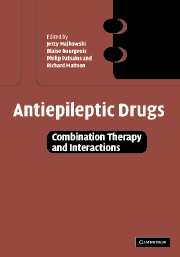Book contents
- Frontmatter
- Contents
- List of contributors
- Foreword
- Foreword
- Acknowledgements
- Part I Introduction
- Part II Pharmacokinetic interactions
- Part III Pharmacodynamic interactions
- Part IV Drug interactions in specific patient populations and special conditions
- 14 Antiepileptic drug interactions in children
- 15 Antiepileptic drug interactions in the elderly
- 16 Antiepileptic drug interactions in pregnancy
- 17 Antiepileptic drug interactions in handicapped and mentally retarded patients
- 18 Antiepileptic drugs and sex steroids
- 19 Antiepileptic drug interactions in patients requiring psychiatric drug treatment
- 20 Antiepileptic drugs in non-epileptic health conditions: possible interactions
- 21 Drug monitoring in combination therapy
- 22 Cognitive side-effects due to antiepileptic drug combinations and interactions
- Part V Conclusions and future perspectives
- Index
22 - Cognitive side-effects due to antiepileptic drug combinations and interactions
from Part IV - Drug interactions in specific patient populations and special conditions
Published online by Cambridge University Press: 07 September 2009
- Frontmatter
- Contents
- List of contributors
- Foreword
- Foreword
- Acknowledgements
- Part I Introduction
- Part II Pharmacokinetic interactions
- Part III Pharmacodynamic interactions
- Part IV Drug interactions in specific patient populations and special conditions
- 14 Antiepileptic drug interactions in children
- 15 Antiepileptic drug interactions in the elderly
- 16 Antiepileptic drug interactions in pregnancy
- 17 Antiepileptic drug interactions in handicapped and mentally retarded patients
- 18 Antiepileptic drugs and sex steroids
- 19 Antiepileptic drug interactions in patients requiring psychiatric drug treatment
- 20 Antiepileptic drugs in non-epileptic health conditions: possible interactions
- 21 Drug monitoring in combination therapy
- 22 Cognitive side-effects due to antiepileptic drug combinations and interactions
- Part V Conclusions and future perspectives
- Index
Summary
Introduction
The possibility that cognitive impairment may develop as a consequence or aftermath of epilepsy was raised as early as 1885 when Gowers described ‘epileptic dementia’ as an effect of the pathological sequela of seizures. Nonetheless, the topic was not coupled to antiepileptic drug (AED) treatment until the 1970s.
It has now been established that AED treatment may be associated with a variety of side-effects (Aldenkamp, 1995, 1998; Vermeulen and Aldenkamp, 1995, 2001). Some effects appear immediately after the start of drug exposure, such as nystagmus, but are relatively benign because they show habituation (Kulig and Meinardi, 1977), or are reversible when they are dose dependent. Others may be of insidious onset, emerging only after extended periods of treatment (i.e. chronic side-effects). A multitude of such chronic side-effects have been documented (Reynolds, 1975), but the most frequently reported effects concern central nervous system (CNS) effects. This chapter reviews some of our knowledge about a specific subgroup of such CNS-related chronic side-effects of AED treatment, that is, cognitive side effects: the adverse effects of drug treatment on information-processing systems.
Such effects are considered to be much more moderate than for example, some of the idiosyncratic reactions to drugs and normally do not lead to discontinuation of drug treatment.
Keywords
- Type
- Chapter
- Information
- Antiepileptic DrugsCombination Therapy and Interactions, pp. 403 - 418Publisher: Cambridge University PressPrint publication year: 2005

